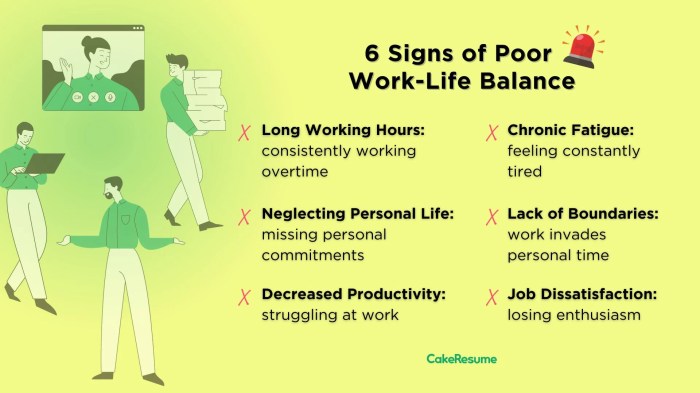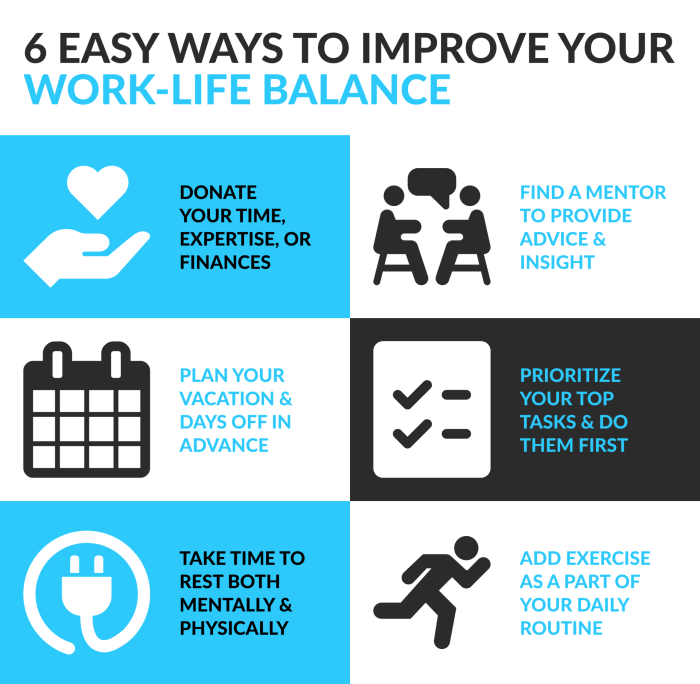Work-Life Balance Tips takes center stage in this guide, offering a fresh take on finding equilibrium in the hustle and bustle of everyday life. Dive in for some hip insights and practical advice that will level up your balancing game.
In a world where juggling work and personal life is a constant challenge, mastering the art of balance is key to unlocking a fulfilling and productive lifestyle.
Importance of Work-Life Balance: Work-Life Balance Tips
Achieving a work-life balance is essential for overall well-being. It involves finding a harmony between the demands of work and personal life to avoid burnout and maintain a healthy lifestyle.
Impact on Mental Health
A lack of work-life balance can have a detrimental effect on mental health. Constantly being overwhelmed with work responsibilities without taking time for oneself can lead to stress, anxiety, and even depression. It is crucial to prioritize self-care and relaxation to prevent these negative impacts on mental well-being.
Improvement in Productivity
When individuals are able to achieve a healthy work-life balance, it can significantly improve productivity. By setting boundaries and taking breaks when needed, employees can recharge and come back to work with a fresh perspective. This can lead to increased focus, creativity, and efficiency in completing tasks.
Strategies for Achieving Work-Life Balance

When it comes to achieving work-life balance, setting boundaries, effective time management, and self-care practices are key components to consider.
Setting Boundaries Between Work and Personal Life
Creating clear boundaries between work and personal life is essential for maintaining a healthy balance. Here are some methods to help you set boundaries:
- Avoid checking work emails or messages outside of work hours.
- Designate specific times for work and personal activities to avoid overlap.
- Communicate your boundaries with colleagues and family members to ensure they respect your time.
Tips for Time Management
Effective time management is crucial for balancing work and personal commitments. Here are some tips to help you manage your time effectively:
- Create a daily schedule or to-do list to prioritize tasks.
- Avoid multitasking and focus on one task at a time to improve productivity.
- Take short breaks throughout the day to recharge and avoid burnout.
Significance of Self-Care Practices
Self-care practices play a vital role in maintaining work-life balance. Here’s why self-care is important:
- Self-care helps reduce stress and improve overall well-being.
- Engaging in activities you enjoy outside of work can help you relax and recharge.
- Prioritizing self-care allows you to be more present and focused in both your work and personal life.
Work-Life Balance Challenges

Many individuals struggle with maintaining a healthy work-life balance due to various challenges that arise in their personal and professional lives.
Impact of Technology on Work-Life Balance
Technology has significantly blurred the boundaries between work and personal life, making it challenging for individuals to disconnect and recharge.
- The constant connectivity through smartphones and emails can lead to increased stress and burnout.
- Work-related tasks often spill over into personal time, disrupting relaxation and family activities.
- Social media and digital distractions can consume valuable time that could be spent on personal well-being.
Strategies to Overcome Obstacles
Despite these challenges, there are effective strategies individuals can implement to achieve a more balanced lifestyle.
- Set boundaries: Establish clear boundaries between work and personal time to avoid overlap and maintain a healthy separation.
- Practice time management: Prioritize tasks, set realistic goals, and allocate time for both work responsibilities and personal activities.
- Unplug regularly: Take breaks from technology, especially during evenings and weekends, to focus on self-care and relaxation.
- Delegate and ask for help: Don’t hesitate to delegate tasks at work or seek support from family and friends to lighten the load and reduce stress.
- Prioritize self-care: Make time for activities that promote physical, mental, and emotional well-being, such as exercise, hobbies, and spending time with loved ones.
Benefits of Work-Life Balance
Achieving work-life balance comes with a multitude of benefits that positively impact various aspects of our lives.
Improved Physical Health
Maintaining a healthy work-life balance can significantly improve physical health. When individuals have time to focus on themselves outside of work, they are more likely to engage in activities that promote well-being such as exercise, proper nutrition, and sufficient rest. This can lead to reduced stress levels, better immunity, and overall improved physical health.
Enhanced Relationships with Family and Friends
Work-life balance allows individuals to prioritize quality time with their loved ones, fostering stronger relationships with family and friends. By being present and emotionally available, individuals can create lasting bonds and support systems that contribute to their overall happiness and well-being.
Companies that Prioritize Work-Life Balance, Work-Life Balance Tips
Several successful companies have recognized the importance of work-life balance and have implemented policies to support their employees in achieving it. For example, Google is known for its flexible work hours, on-site amenities, and supportive work culture that values employee well-being. As a result, Google has seen increased employee satisfaction, productivity, and retention rates, showcasing the benefits of prioritizing work-life balance in the corporate world.

